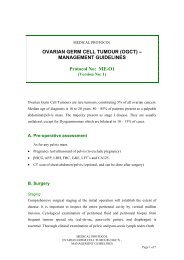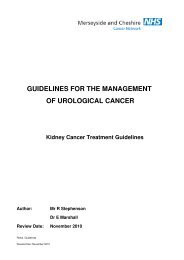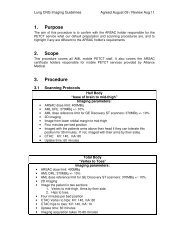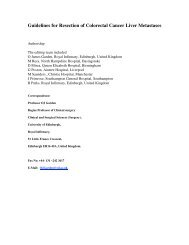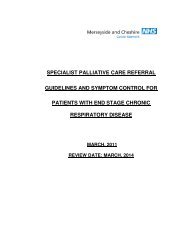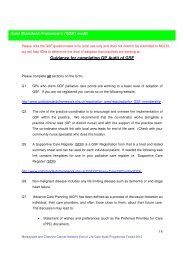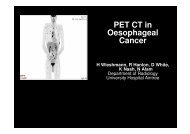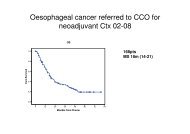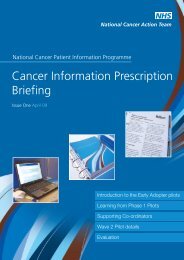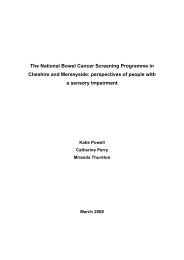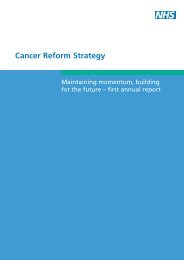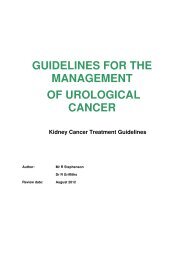Cancer Reform Strategy - NHS Cancer Screening Programmes
Cancer Reform Strategy - NHS Cancer Screening Programmes
Cancer Reform Strategy - NHS Cancer Screening Programmes
- No tags were found...
You also want an ePaper? Increase the reach of your titles
YUMPU automatically turns print PDFs into web optimized ePapers that Google loves.
CHAPTER 5: LIVING WITH AND BEYOND CANCER 79patients include the cost of adjusting todisabilities caused by cancer or cancer treatment,prescription charges and the cost of home care.Estimates suggest that the cost of these tocancer patients could be around £200 a year.5.51 The impact of cancer on patients is also feltthrough loss of earnings. The Macmillan surveyindicated that 91% of cancer patients’ householdssuffer a loss in income and/or increased costs as adirect result of cancer. Among under 55s, sevenout of ten suffer a loss in household income, withan average fall of 50%.Access to benefits5.52 Depending on their individualcircumstances, cancer patients are entitled tothe full range of social security benefits,including daily living costs and housing costs.In addition, special provision is made forterminally ill patients who may have their benefitclaims processed more quickly. Special rules existfor some benefits to enable people who areterminally ill to be awarded higher amounts ofsome benefits. The parents of a child who isterminally ill can withdraw money from theChild Trust Fund without waiting until the childis 18. Those who care regularly and substantiallyfor a severely disabled person may also beeligible to claim a carer’s allowance.5.53 There are a number of ways in which theDepartment of Health is working to supportpeople in financial hardship with the costsassociated with their healthcare. The <strong>NHS</strong> LowIncome Scheme provides support for people infinancial difficulties with prescription charges,dental treatment, sight tests and glasses andtravel to receive <strong>NHS</strong> treatment through theHospital Travel Costs Scheme.5.54 What is clear, however, is that the majorityof cancer patients are not aware of the supportavailable to them. The 2005 National AuditOffice report found that 77% of cancer patientsare not given any financial supportinformation. 32 We must therefore do more tosupport patients facing financial pressures as aresult of their diagnosis. As part of integratedservices, commissioners should ensure thatall people affected by cancer are giveninformation about what financial help(including welfare benefits) is available andhow to access that help and their rightsunder the Disability Discrimination Act.Information prescriptions would be anappropriate way of delivering this andinformation on financial benefits will bemade available on the forthcoming nationalinformation pathways from 2008.Box 31: Accessing information on financial help for patientsMacmillan <strong>Cancer</strong> Support has been developing a model for delivering benefit information andadvice for people affected by cancer. This comprises:●●●●A network of local face-to-face advice services together with a national telephone helplinefor people who need specialist advice and advocacy;A suite of printed and on-line financial information resources;A web based self assessment tool to help patients and carers identify potential benefitentitlement; andA web based e learning module to raise benefit awareness among health professionals andhelp them signpost patients and carers to advice services more effectively.Macmillan aims to establish advice services in every PCT and has already developed 61 localservices across England in partnership with Citizens Advice and other specialist advice providers.Macmillan have estimated that in 2007, the combined impact of this model is that over£55 million in previously unclaimed benefits for patients and carers will have been identifiedand over 26,000 people helped with advice.



